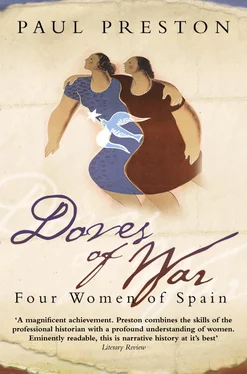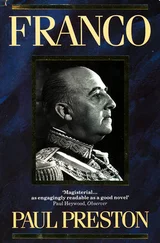Leaving Pip to wind up the estate, José Luis seized the opportunity to go on ahead to Paris in April 1951. José Luis’s attitude to his children had been at best lukewarm so John and Carmen were sent to England to live with Gaenor while Pip and José Luis tried to rebuild their fortunes, both emotional and financial, in Paris. There he wrote his first novel, Les Ramblas finissent à la mer. He claims that, realising that he did not want to share a life with Pip and their children in a Parisian apartment, he immediately persuaded her to live somewhere where he might visit them occasionally. The facts are that they separated only after seven years of deteriorating relations spent in different Parisian apartments. The relationship was doomed since José Luis was concerned only with establishing himself as an actor and a novelist – yet neither of them seemed prepared to bring it to an end. Along the way, he led a life of epicurean dissolution. According to his own accounts, he was taking money from a series of rich, older women, including someone called Kitty Lillaz and the actress Madeleine Robinson, whom he passed off as his wife. Pip knew but suffered in silence. Finally, on her fortieth birthday in 1956, she got access to her money and she bought a flat for them both in the rue Alsace Lorraine in the Bois de Boulogne. José Luis borrowed much of her remaining money and promised to return it when he inherited from his father. This he never did. To compensate for not seeing her children in school term time, Pip regularly indulged them with extravagant holidays skiing in Switzerland or Austria in winter, swimming at St Tropez or Monte Carlo in summer. 186 When she did have access to her own funds, according to José Luis, Pip frittered them away in acts of absurd generosity, of which he was often a beneficiary himself 187
José Luis also claims to have still possessed a large portfolio of drawings, watercolours and oils taken from his father-in-law’s collection which facilitated his high-society existence. Once he had eventually found success as a novelist and journalist and insinuated himself into the world of cinema, divorce from Pip was inevitable. What is really astonishing – and suggests that there was more to the relationship than he admits – is that it took him so long to seek a divorce. In his memoirs, he depicts Pip’s presence as an intolerable invasion of his privacy. If this is true, for a woman as insecure and as desperate to please as Pip, it must have been unbearable as, in the most adolescent fashion, he flaunted his many lovers. He claims that things reached a peak when, one night in Paris, no doubt driven by his own guilt, he tried to strangle her. 188 Again the truth about the end of the relationship was less dramatic. In 1958, he appeared in a very minor role in Louis Malle’s Les Amants starring Jeanne Moreau. In 1961, he had an equally small role in Blake Edwards’ Breakfast at Tiffany’s.189 José Luis was increasingly away on location or else with one of his many lovers. Pip had long since suggested that, given the needs of her health and the children’s welfare, they should live in the South and there was no way that he would leave the capital.
Eventually, in 1958, Pip bought some land at Auribeau-sur-Siagne near Cannes. In a last effort to hold on to José Luis, and to make a home for her children, she created a splendid house out of two workmen’s cottages knocked into one. The land had the small river Siagne running through it and, on the other side of the small valley from the main house, there were two small houses where the children stayed. José Luis did not live with the family at Auribeau although he visited frequently, having found another rich older woman, Countess Rosemarie Tchaikowska, with a house nearby. When he did visit, he would childishly challenge Pip by often disappearing in search of conquests in Cannes. 190 Increasingly alone with her children, Pip was not happy. There were occasional affairs but nothing could console her for the loss of her husband. Although a very competent mother, her son remembers Pip as sparing in her affections. His abiding memory is of her sitting at a desk and turning towards him, ‘her knees like the double barrels of a shotgun’. He cannot remember her ever kissing him. His daughter recalled ‘she was there, she was fun, but did not take part in the everyday nitty-gritty of life till much later on. All that was taken care of by the nuns at boarding school or the servants at home.’ In that sense, Pip was following in the footsteps of her own mother. She really came into her own as a mother when her children grew older and were able to have a more ‘adult’ relationship. Both her daughter and her niece remember her to be ‘loving and understanding’ and a fount of boundless fun and someone with whom they could always talk about their troubles. The children were sent to boarding school in England and they would meet for spectacularly expensive holidays. Pip drank heavily, although never before 6.30 p.m., and never betraying the effects of alcohol. When she came to England to return the children to school after some holiday jaunt, they would stay at the Mandeville Hotel where she had once stayed with José Luis. She would leave them watching television while she went out in a desperate attempt to recreate the glittering social life of her youth. 191
Конец ознакомительного фрагмента.
Текст предоставлен ООО «ЛитРес».
Прочитайте эту книгу целиком, купив полную легальную версию на ЛитРес.
Безопасно оплатить книгу можно банковской картой Visa, MasterCard, Maestro, со счета мобильного телефона, с платежного терминала, в салоне МТС или Связной, через PayPal, WebMoney, Яндекс.Деньги, QIWI Кошелек, бонусными картами или другим удобным Вам способом.












